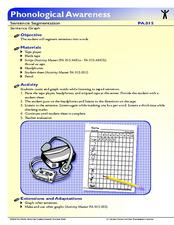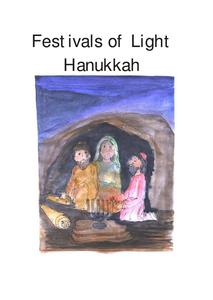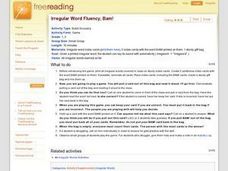Houghton Mifflin Harcourt
Smart Solutions: English Language Development Lessons (Theme 6)
Smart Solutions is the theme of a unit created to meet the needs of English language earners. Through a series of lessons, scholars follow a routine—move, speak, and listen— to cover topics including stores, shops, celebrations, pets,...
Curated OER
Sharing African Culture
Students investigate African American culture by reading aloud an African folk tale and illustrating the tale. They use their illustrations to create a book or a bulletin board that retells the folk tale.
Florida Center for Reading Research
Phonological Awareness: Sentence Segmentation, Sentence Graph
Young scholars segment sentences while they listen to a series of sentences. Using a graph, pupils make a mark for each word they hear. Learners listen to each sentence three times; once to listen, once to mark, and once to check their...
Curated OER
“THE LORAX” by Dr. Seuss
Few children's books convey the message of conservation as well as Dr. Seuss' The Lorax. Read the story aloud, emphasizing the interconnectedness of plants and animals in an ecosystem and discussing different ways people can help the...
Council for the Curriculum, Examinations and Assessment
Festivals of Light Hanukkah
Five sessions make up a lesson on the Jewish celebration of Hanukkah. After reading and teaching young historians the history of the Jewish holiday, learners explore the celebration through hands-on activities and collaborative learning.
Class Antics
Leap Year
What is a Leap Year and why do we have it? Find out with this Leap Day/Leap Year response to reading activity in which scholars read a short passage and use their new-found knowledge to answer five questions with short answers.
Curated OER
Satire and The Adventures of Huckleberry Finn
Does Mark Twain’s satire become sarcasm and does he cross the line of propriety in The Adventures of Huckleberry Finn? As an introduction of satire, class members view an excerpt from The Daily Show and discuss Stewart's use of this...
Scholastic
Groundhog Day
A simple activity for a simple, but special, holiday. Young learners read a brief history of Groundhog Day, practice reading aloud, and then discuss how shadows are formed.
Curated OER
Pendemonium: The Great African Surfari
Young scholars discover the importance of matching verbs to their subjects through a discussion of a whimsical video on verb agreement and a read aloud of the book, "To Root, To Toot To Parachute". They practice verb agreement in...
Curated OER
The Secret School: chapters 2 and 3
Second graders read chapters 2 and 3 of The Secret School and answer discussion questions as they read. For this reading lesson plan, 2nd graders also read aloud in pairs and complete a worksheet.
Curated OER
Reading Research!
Students observe the pictures in non-fiction books that focus on animals in the winter. In addition, they also listed to some read aloud books about hibernation, migration, adaptation and dormancy. Students draw pictures and write notes...
Curated OER
Read it in Your Head
First graders observe as the teacher reads a sentence from a book in a whisper tone and then without making a sound but moving her lips. They then find a book that they would like to read and practice silent reading. Small groups then...
Curated OER
Once Upon A Bear
Students study different types of bears, their characteristics, and habitats. They discuss what they know and what they want to learn before visiting a website to look at images and information about bears. They listen to teacher read...
Curated OER
Cloudy With a Chance of Meatballs
Fourth graders participate in an activity which introduces them to common types of precipitation. They examine "Cloudy With a Chance of Meatballs" through a teacher read aloud and make a weather pamphlet.
Curated OER
Reading for Tone and Inference
Using a reading passage, this instructional activity leads learners through an exploration of a text. This activity focuses on identifying what the reading passage is about, its tone, and key elements.
Curated OER
The Secret School-Chapter 4
Fourth graders read The Secret School. In this language arts lesson, 4th graders discuss the characters in the story and read aloud using fluency while reading. Students write a summary of the chapter.
Curated OER
WHAT DO BEARS EAT AND HOW DO THEY WALK?
Students listen to the poem "Five Bears" read aloud several times, and study what bears eat by naming the foods (mentioned in the poem) out loud. They draw a picture to illustrate one line of the poem and practice choral reading.
Curated OER
Cause and Effect
Third graders listen to a story read aloud in order to discover the concept of cause and effect. With a partner, they make a cause/effect puzzle from a sentence strip. They then choose and read a story on the internet and make a...
Curated OER
Not Just Words
Students work to improve their oral expression while reading aloud. They read and record an entire story with a partner and listen to the playback of the readings. They evaluate their expressive language using a given checklist.
Curated OER
Thumbs Up For Expert Readers!
Young scholars use the cross check strategy to increase reading comprehension in this lesson. They listen as the teacher reads "Where the Wild Things Are." The teacher purposely reads some words wrong so that the story does not make...
Curated OER
Journey to Topaz: Directed Reading Thinking Activity
Have you used the directed reading thinking activity in your classroom? Doubling as either a prereading strategy, or a during reading strategy, it helps readers connect the historical background of the text to the text itself. As the...
Curated OER
Irregular Word Fluency, Bam!
Build word fluency! With this word recognition instructional activity, first and second graders play a game to practice saying irregular words with automaticity. They play in small groups using a set of word cards provided by their...
Curated OER
Ray Bradbury Short Stories - Independent Reading Activity
A straightforward lesson about the themes in Ray Bradbury's short stories, this activity allows learners to first work independently and then share their analyses with the class. They read "The Other Foot" as well as another story from...
Curated OER
Using a Title to Determine Main Idea (Nonfiction)
Young readers explore a nonfiction text for its main idea. They will listen to the book Animal Sight by Kirsten Hall, and then observe as the teacher models a main idea think-aloud. Later, for independent practice, they listen to the...

























